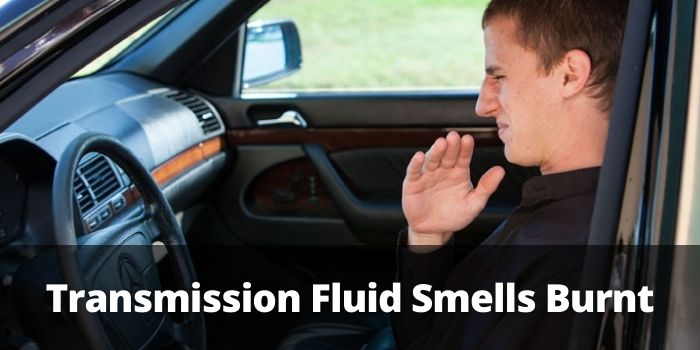So you’re driving, and all of a sudden, you get that burnt smell.
You know the one – the smell that makes your stomach turn and your heart rate spike because you just know something is wrong.
Well, chances are, if you smell transmission fluid burning, it’s not a good sign. It could mean that your car needs some serious repairs.
But don’t worry!
In this post, I will help explain what that burnt transmission fluid smell means and what steps you can take to fix it. So keep reading to learn more…
Table of Contents
Causes of Transmission Fluid Burn Odor
Burning transmission fluid has a unique, pungent smell similar to burning rubber.
A few common symptoms can indicate this problem which includes:
- The transmission slipping or jerking
- Car struggling to accelerate and burning smell
- A burning smell coming from the engine bay
- The engine RPMs go up and down when you’re stopped or driving at a constant speed
- A decrease in fuel efficiency
When you know these signs, you need to understand the common causes of the problem before you check the possible solutions. These causes include:
1- Old Fluid
Over time, transmission fluid breaks down and starts to form sludge. If the fluid becomes too thick, it can clog the filter and cause the transmission to overheat.
If you don’t change your transmission fluid on time, it will break down and become contaminated over time.
This can damage the transmission and lead to premature failure, along with poor performance and reduced fuel efficiency.
2- Leakage
Transmission fluid leaks can be caused by many other factors, including a faulty gasket or seal, a cracked transmission pan, or a hole in the transmission. These issues will need to be repaired before the leak can be fixed.
In some cases, transmission fluid leaks can be caused by overfilling the transmission. This is usually due to a mistake made when changing the fluid. If too much fluid is added, it can cause a leak.
3- Overworked Transmission
The transmission will have to work harder than expected and gets overheated if you’re constantly driving in stop-and-go traffic or towing heavy loads. This causes a foul smell.
How to Fix the Burning Transmission Fluid Problems?
If you’re smelling burning transmission fluid, you can fix the problem by…
1- Checking the Transmission Fluid Level
If the fluid is low, it could be burning because it’s not being cooled properly.
- To check the fluid level, open the hood and locate the dipstick.
- Then, wipe the dipstick clean and reinsert it into the transmission.
- Once it’s all the way in, pull it out and check the fluid level.
- If the fluid is low, add more until it reaches the “full” line on the dipstick.
2- Change the Transmission Fluid
If the fluid is old or burned, it must be changed by draining the old fluid and then adding new fluid.
This can be done at home, but I recommend taking it to a professional if you’re uncomfortable doing it yourself.
If there’s a leak, you’ll need to repair it (by replacing the damaged seal or gasket) before adding new fluid. Otherwise, the new fluid will just leak out.
The cost to fix a burning transmission fluid smell and leaks will vary depending on the cause. In some cases, simply changing the fluid can resolve the issue.
However, if there is damage to the transmission, it may need to be repaired or replaced, which can be costly.
3- Cool the Transmission and Drive More Carefully
If the transmission is overheating, cool it down before adding new fluid.
One way to do this is to add a transmission cooler which will help dissipate the heat and prevent the fluid from burning.
Another way to cool the transmission is to take a break from driving and let it rest for a few hours. This will give the transmission time to cool down before you start driving again.
Also, if you’re constantly driving in stop-and-go traffic or towing heavy loads, it’s going to put a lot of strain on the transmission.
To reduce the strain on the transmission, try to avoid stop-and-go traffic and take it easy when you’re carrying a heavy load.
How Often Do You Need to Change Transmission Fluid?
The question of how often to change transmission fluid is a contentious one.
Some mechanics will tell you that you should change it every 30,000 miles, while others say it can last up to 100,000 miles.
In general, it’s a good idea to have your transmission fluid checked every 20,000 miles and changed if necessary.
This ensures that your transmission stays in good working order and doesn’t break down prematurely.
While manual transmissions generally don’t require as much maintenance as automatics, they still need to be lubricated, and the fluid should be changed every 30,000 miles or so.
This is because manual transmissions have more gears and moving parts than automatics, so there’s more potential for wear and tear.
If you have an automatic transmission, the fluid should be changed every 40,000 to 50,000 miles. However, if you drive in a highly dusty condition, you should change it more frequently.
How to tell if your vehicle needs the transmission fluid change?
The truth is, it depends on a number of factors, including the type of vehicle you drive, the type of transmission (manual or automatic), how you drive it, and the conditions you typically drive in.
If you do a lot of stop-and-go driving in hot weather, your vehicle’s transmission fluid will break down more quickly and must be changed more often.
Similarly, if you tow a lot or regularly haul heavy loads, the transmission will work harder and need more frequent changes.
On the other hand, if you mostly drive on highways in moderate conditions, the transmission fluid will last a bit longer.
The best way to determine how often to change your transmission fluid is to consult your owner’s manual.
Every car/truck is different, and the manufacturer will have specific recommendations based on the make and model of your vehicle. So following their recommendations is the best route to go.

Based in Orem (Utah) John Paterson graduated from Utah Valley University and has begun writing in 2009. He has a large wealth of experience in writing articles related to cars, automotive repair, wheels, cleaning/maintenance, and much more. He has also written instructional articles in a similar niche for a few online publications as well. Currently, he works as a mechanic in his personal garage shop where he loves serving his countrymen from his heart.






